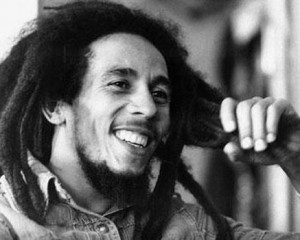30 years without Bob Marley
In our fast-paced world, a celebrity is created virtually every minute. But there are few musical celebrities with a legacy as enduring as that of Nesta Robert ‘Bob’ Marley.
Today marks the 30th anniversary of the death of a true musical pioneer, a man whose impact transcended class, race and culture all over the world. The reggae legend inspired an almost spiritual following among a diverse set of believers, who expressed their devotion in iconography as varied as indigenous Australian shrines and posters on college-dorm-room walls.
But the question must be asked – Why do so many people connect with Marley? The answer is fairly simple – Marley was an everyman, a gentle soul and a revolutionary. Many have identified with his humble upbringing in the tiny island of Jamaica, the Pan-African beliefs stemming from his Rastafarian faith, and his advocacy of social justice. When he penned politically charged songs like ‘I Shot the Sheriff’ and ‘Get Up Stand Up,’ they resonated as far more than mere recordings. They were calls to action.
Many of Marley’s greatest and most recognizable hits came with the Wailers (including Peter Tosh and Bunny Wailer), who grew up beside him in Trench Town, a Kingston ghetto that spawned many musical greats.
Influenced by American music from the era, the band imbued their traditional Jamaican rhythms with the soul of Motown, creating a different take on black music.
Bob Marley’s musical legacy may be waning 30 years after his death, but the singer remains a highly commercialized cult figure.
Marley has become a merchandiser’s dream, with everything from shoes to snowboards bearing his image. His friends say it would be tragic if his message of justice for the oppressed gets lost to corporate greed.
“He was never about commercialism” – observed one friend, Herbie Miller. “Money was not a motivation.”
For loyal fans of the Third World’s first pop superstar, who died from cancer at the age of 36 on May 11 1981, this year’s milestone anniversary is not about grieving but about celebrating.
“His music was so full of life, it doesn’t seem right to mourn him” – 24-year-old Austrian tourist Bernadette Hellwanter said as she toured Kingston’s Bob Marley Museum.
“The first performance I ever did was at Mount Vernon high school in Fairfax, Virginia” – recalled the 33-year-old Jamaican singer Nickia Palmer, who has spent most of his life in the United States. “It was ‘No Woman No Cry.’”
Fans flock to the museum, an English-style building where Marley lived and wrote many of his songs. Tours are also conducted daily in the village of Nine Mile in rural Saint Ann parish where Marley was born in February 1945.
http://www.youtube.com/watch?v=LhacZt9Nk9g]
Bob Marley died 30 years ago today. His son, Stephen Marley, has been carrying on the name and tradition of the reggae icon and is announcing the forthcoming release of a new solo studio album entitled, Revelation Part 1. The Root of Life.
The album is due to hit the streets on Universal Records/Ghetto Youths International, Inc on May 24.
Later this year, the five-time Grammy Award-winning producer, singer-songwriter and multi-instrumentalist plans to release a follow-up to the Root of Life album.
Revelation Part 2. The Fruit of Life will lean more towards what Marley describes as an ‘eclectic feel’.
While Stephen Marley has built a formidable reputation handily navigating between genres, Revelation Part 1: The Root of Life marks a return to his roots-reggae foundation.
Jah Army, the first single from Revelation Part 1 is a timeless, dub-tinged Rastafarian anthem, which also features his brother, Damian “Jr Gong” Marley.
Written and produced by Stephen Marley, the Marley brothers recorded Jah Army at Tuff Gong studios in Kingston, Jamaica, and the Lion’s Den in Miami, Florida.
The single already set off a media frenzy when a few versions – including a version with vocals by the Marley brothers alongside Buju Banton and a remix version, which is complete with a selection from a classic Biggie Smalls freestyle – surfaced online in December of 2010.
Giving fans a taste of what to expect from Revelation Part 1, Stephen Marley recently released a follow-up track to Jah Army, titled ‘No Cigarette Smoking’.
